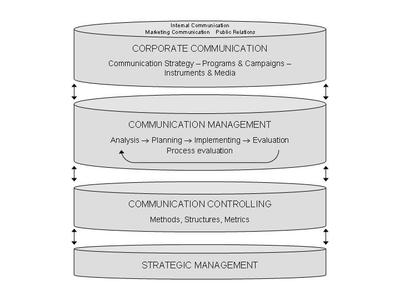Basic principles
The term "communication controlling" is liable to be misunderstood. That is why it is all the more important to develop a precise understanding of what the phenomenon it involves.
Professional communication is not only high-cost, but high-risk. It succeeds only if acts of communication and cognition converge, i.e. when the parties involved concert their actions with those of the respective other party (Burkart 2004). The communication of meaning is not an end in itself. It serves superior interests, both on the communicator's side and on the recipient's side. For instance, consumers / citizens seek to satisfy their need for information or entertainment, while business organizations pursue economic ends and safeguard their legitimation. Communication controlling enables these interests to be addressed in the planning and performance of communication measures.
Definition: communication controlling
Communication controlling is a support and control mechanism that creates transparency in terms of strategy, processes, results and finances for the division-of-labor-based process of communication management, and provides suitable methods, structures and indicators for the planning, performance and monitoring of corporate communication and public relations (Zerfaß 2006; also Piwinger/Porák 2005, Pfannenberg/Zerfaß 2005, Rolke/Koss 2005).
Communication controlling provides an armoury of suitable methods for exploring value addition through communication and for evaluating PR, which are then used by PR professionals themselves in the course of communication management. The evaluation, i.e., retrospective, in-process or predictive monitoring, of PR measures as a phase of communication management is part of the domain of communication controlling and must not be equated with the latter.
Hinge between corporate governance and communication management
Communication controlling is the hinge between control of the organization as a whole and communication management (see graphic). Governance, communication management and/or specialist controlling departments must establish a controlling system adapted to suit the respective strategy and organizational structure, to ensure that communication tasks in all their diversity can be met by division of labor and nevertheless in a goal-directed manner. This will create sustained competitive advantages. Making the right decisions at this level ensures the best possible utilization of expertise and creativity when it comes to management and communication measures.
Accordingly, communication controlling is a management task to be taken in hand by senior management (CEO/CFO) and communication management. The task cannot be delegated outside, but can of course be coordinated by staff departments, and its development can be supported by consultants or practiced researchers. Evaluation service providers, media observers, etc. can lend valuable support during implementation.
Communication management and corporate communication
Communication management is concerned with the planning, organization and evaluation of all communication activities, i.e. symbolic acts with which the organization and its representatives attempt to communicate something to others or endeavor to understand the pertinent forms of expression. This is the basic task of communication departments and service providers, e.g. PR agencies.
The subject matter and outflow of these efforts is corporate communication. It embraces all communication processes for internal and internal coordination of action and clarification of interests between the organization and its stakeholder groups, including the building up of reputation capital. In terms of business administration, it is useful to distinguish between public relations, marketing communication and internal communication (Zerfaß 2007, van Riel/Fombrun 2007, Mast 2006).
References
Texts available in English
Van Riel, Cees B. M./Fombrun, Charles (2007): Essentials of Corporate Communication. Implementing Practices for Effective Reputation Management. New York: Routledge.
Zerfass, Ansgar (2009): Institutionalizing Strategic Communication: Theoretical Analysis and Empirical Evidence. In: International Journal of Strategic Communication, Vol. 3, 69-71.
Zerfass, Ansgar (2008): Corporate Communication Revisited: Integrating Business Strategy and Strategic Communication. In Zerfass, Ansgar/Van Ruler, Betteke & Sriramesh, Krishnamurthy (Eds.): Public Relations Research. European and International Perspectives and Innovations. Wiesbaden: VS Verlag für Sozialwissenschaften, pp. 65-96.
Selected text in German
Pfannenberg, Jörg/Zerfaß, Ansgar (Eds.) (2010): Wertschöpfung durch Kommunikation. Strategisches Kommunikations-Controlling in der Unternehmenspraxis, 2. völlig überarbeitete Auflage. [Adding value through communication. Strategic communication controlling in business, 2nd completely updated edition]. Frankfurt/Main.: Frankfurter Allgemeine Buch.


